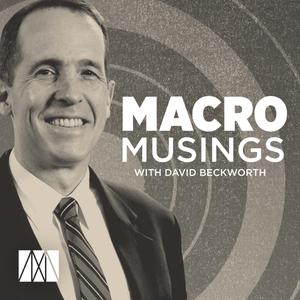
Macro Musings with David Beckworth
Mercatus Center at George Mason University
- 1 hour 56 secondsPeter Conti-Brown on the Fed under Trump 2.0, Reforming the Discount Window, and Providential Moments
Peter Conti-Brown is a historian and legal scholar of the Federal Reserve System and an associate professor at the Wharton School of Business at the University of Pennsylvania. Peter returns to the podcast to discuss the state of Federal Reserve leadership under the incoming Trump administration, expectations for Fed independence, a new proposal for limiting stigma at the discount window, stories about a life lead by faith, and much more.
Check out the transcript for this week’s episode, now with links.
Recorded on January 10th, 2025
Follow David Beckworth on X: @DavidBeckworth
Follow Peter Conti-Brown on BlueSky: @PeterContiBrown
Follow the show on X: @Macro_Musings
Check out our new AI chatbot: the Macro Musebot!
Join the new Macro Musings Discord server!
Join the Macro Musings mailing list!
Check out our Macro Musings merch!
Subscribe to David's new BTS YouTube Channel
Timestamps:
(00:00:00) – Intro
(00:01:23) – Reaching Audiences Through Various Forms of Media
(00:10:30) – Federal Reserve Under Trump 2.0
(00:21:33) – Jerome Powell
(00:25:56) – Michael Barr
(00:34:52) – New Discount Window Proposal
(00:40:27) – Faith Life
(00:56:28) – Radical Uncertainty
(01:00:15) – Outro
20 January 2025, 10:00 am - 54 minutes 43 secondsDavid Bahnsen on the Incoming Trump Administration and the Financialization of the US Economy
David Bahnsen is a Wall Street veteran and currently is the managing director of The Bahnsen Group. In David’s first appearance on the podcast, he talks through multiple questions about the incoming Trump Administration, the problem with the growing indebtedness of the US government, shifts in the Republican party, the notion of financialization of the US economy, and much more.
Check out the transcript for this week’s episode, now with links.
Follow David Beckworth on X: @DavidBeckworth
Follow David Bahnsen on X: @DavidBahnsen
Follow the show on X: @Macro_Musings
Check out our new AI chatbot: the Macro Musebot!
Join the new Macro Musings Discord server!
Join the Macro Musings mailing list!
Check out our Macro Musings merch!
Subscribe to David's new BTS YouTube Channel
Timestamps:
(00:00:00) – Intro
(00:01:50) – David Bahnsen’s Career Path
(00:04:39) – Shifts in the Republican Party
(00:12:20) – Trump Administration 2.0 and Growth, the Fed, and the Financial Sector?
(00:33:38) – Financialization and Missed Boats
(00:54:02) – Outro
13 January 2025, 10:00 am - 52 minutes 25 secondsMarijn Bolhuis on Fiscal R-star and its Implications for Macroeconomic Policy
Marijn Bolhuis is an economist in the World Economic Studies Division of the IMF’s research department. In Marijn’s first appearance on the podcast he discusses his new paper, which introduces the idea of a fiscal r-star, and expands on another paper which helps economists understand why consumer sentiment is so depressed, despite relatively low unemployment and inflation coming back to target.
Check out the transcript for this week’s episode, now with links.
Follow David on X: @DavidBeckworth
Follow Marijn on X: @MA_Bolhuis
Follow the show on X: @Macro_Musings
Check out our new AI chatbot: the Macro Musebot!
Join the new Macro Musings Discord server!
Join the Macro Musings mailing list!
Check out our Macro Musings merch!
Subscribe to David's new BTS YouTube Channel
Timestamps:
(00:00:00) – Intro
(00:01:38) – Marijn Bolhuis’ Career Path
(00:06:02) – Fiscal R-Star
(00:45:30) – Cost of Money and Consumer Sentiment
(00:51:43) – Outro
6 January 2025, 1:00 pm - 37 minutes 54 secondsMacro Musings 2024 Retrospective
David Beckworth and producer Sam Alburger dive into the last year of Macro Musings. They pick their favorite episodes, discuss how the year 2024 will be remembered in the macroeconomic history, highlight stories about the making of the show, combine David’s love for basketball and economics, and much more.
Check out the transcript for this week’s episode, now with links.
Follow David on X: @DavidBeckworth
Follow the show on X: @Macro_Musings
Check out our new AI chatbot: the Macro Musebot!
Join the new Macro Musings Discord server!
Join the Macro Musings mailing list!
Check out our Macro Musings merch!
Subscribe to David's new BTS YouTube Channel
Timestamps:
(00:00:00) – Intro
(00:01:18) – Year in Review
(00:11:48) – New Macro Musings Content
(00:15:13) – NGDP Level Targeting vs. FAIT
(00:18:43) – Preparing for Macro Musings Interviews
(00:24:23) – Macro Musings and AI
(00:26:17) – Looking Back at 2024 in Macroeconomic History
(00:30:27) – Combing David’s Love for Economics and Basketball
(00:34:34) – Thank You’s
(01:00:13) – Outro
30 December 2024, 1:00 pm - 1 hour 53 secondsGeorge Selgin on Strategic Bitcoin Reserves, Debanking, and the Fed’s Framework Review
George Selgin is a senior fellow and director emeritus of the Center for Monetary and Financial Alternatives at the Cato Institute. George is also a returning guest to the program, and he rejoins David on Macro Musings to talk about crypto, strategic Bitcoin reserves, and the Fed’s framework review. Specifically, David and George also discuss George’s outlook for a strategic Bitcoin reserve in the US, the significance of the debanking problem, the path to adopting a nominal GDP targeting framework, and much more.
Transcript for this week’s episode.
George’s Twitter: @GeorgeSelgin
George’s Cato profile
David Beckworth’s Twitter: @DavidBeckworth
Follow us on Twitter: @Macro_Musings
Check out our new AI chatbot: the Macro Musebot!
Join the new Macro Musings Discord server!
Join the Macro Musings mailing list!
Check out our Macro Musings merch!
Related Links:
*The ‘Digital Gold’ Fallacy, or Why Bitcoin Can’t Save the US Dollar* by George Selgin
*The Fed’s 2024-25 Framework Review: Optimizing the Dual Mandate Through Nominal GDP Level Targeting* by David Beckworth
*Building a Better Fed Framework* – A monetary policy conference hosted by the American Institute for Economic Research (AIER)
Caitlin Long’s X thread on debanking
David Marcus’s X thread on how Libra was killed
*Does Sovereign Default Risk Explain Cryptocurrency Adoption? International Evidence from Mobile Apps* by Rashad Ahmed, Stephen Karolyi, and Leili Pour Rostami
*Digital Gold: Evaluating a Strategic Bitcoin Reserve for the United States* by the Bitcoin Policy Institute
*Trump Likes the Idea of a Federal Bitcoin Reserve. Don’t Laugh.* by Tyler Cowen
Timestamps:
(00:00:00) – Intro
(00:01:34) – Evaluating the Strategic Bitcoin Reserve and Digital Gold
(00:26:22) – George’s Outlook for the Strategic Bitcoin Reserve
(00:34:16) – The Significance of the Debanking Problem and the Case of Libra
(00:43:18) – *Building a Better Fed Framework*: George’s Takeaways
(00:49:16) – The Path to Nominal GDP Targeting: Incremental vs. Radical
(00:54:10) – Characterizing a Fed Framework Consensus
(01:00:13) – Outro
23 December 2024, 5:01 am - 54 minutes 21 secondsJoey Politano on the AI Investment Boom and Trends in Economic Growth
Joey Politano is an economist and a commentator who writes a popular Substack newsletter on economics. Joey is also a returning guest to Macro Musings, and he rejoins David to talk about the AI investment boom and broader economic growth trends. Specifically, David and Joey also discuss generational differences in economic perspectives, the increased demand for nuclear energy, the importance of AI in driving scientific research, and much more.
Transcript for this week’s episode.
Joey’s X: @JosephPolitano
Joey’s Bluesky: @josephpolitano.bsky.social
Joey’s Substack
David Beckworth’s Twitter: @DavidBeckworth
Follow us on Twitter: @Macro_Musings
Check out our new AI chatbot: the Macro Musebot!
Join the new Macro Musings Discord server!
Join the Macro Musings mailing list!
Check out our Macro Musings merch!
Related Links:
*The AI Investment Boom* by Joey Politano
Timestamps:
(00:00:00) – Intro
(00:03:09) – The Competition Between X and Bluesky
(00:10:55) – The Generational Differences in Economic Perspectives
(00:16:23) – Breaking Down the AI Investment Boom
(00:23:55) – Have We Left Behind the World of Secular Stagnation?
(00:27:47) – Did ChatGPT Kickstart the Next Chapter of Growth?
(00:34:35) – AI and Increased Demand for Nuclear Energy
(00:39:45) – The Importance of AI in Driving Scientific Research and Growth
(00:44:34) – The Current State of Economic Growth
(00:53:40) – Outro
16 December 2024, 5:01 am - 56 minutes 6 secondsJeffrey Lacker on the History of Fed Credit Policy and the Four Doctrines of Fed Lending
Jeffrey Lacker is a senior affiliated scholar at the Mercatus Center, and he previously worked at the Federal Reserve Bank of Richmond, where he served as its president from 2004 to 2017. Jeff is also a returning guest to the podcast, and he rejoins David on Macro Musings to talk about the history of the Federal Reserve’s credit policy, as well as a recent Shadow Open Market Committee conference.
Transcript for this week’s episode.
Jeffrey’s website
Jeffrey’s Mercatus profile
David Beckworth’s Twitter: @DavidBeckworth
Follow us on Twitter: @Macro_Musings
Check out our new AI chatbot: the Macro Musebot!
Join the new Macro Musings Discord server!
Join the Macro Musings mailing list!
Check out our Macro Musings merch!
Related Links:
*A 50-Year Retrospective on the Shadow Open Market Committee and its Role in Monetary Policy* — A conference hosted by the Hoover Institution
*From the “Lender of Last Resort” to “Too Big to Fail” to “Financial System Savior”: Federal Reserve Credit Policy and the Shadow Open Market Committee* by Jeffrey Lacker
*Last Resort Lending: Classical Thought vs. Modern Federal Reserve Practice* by Jeffrey Lacker
Timestamps:
(00:00:00) – Intro
(00:01:47) – The Shadow Open Market Committee and its Contributions Throughout Time
(00:05:32) – Highlights from the Recent Shadow Open Market Committee Conference
(00:10:17) – From FAIT Back to FIT?
(00:14:07) – *Federal Reserve Credit Policy and the Shadow Open Market Committee*: Motivation and Summary
(00:16:05) – Breaking Down the Difference Between Credit Policy and Monetary Policy
(00:22:10) – The Four Doctrines of Fed Lending: The Monetary Stability Doctrine
(00:28:56) – The Four Doctrines of Fed Lending: The Real Bills Doctrine
(00:34:49) – The Four Doctrines of Fed Lending: Warburg’s Mercantilism
(00:39:11) – The Four Doctrines of Fed Lending: Too-big-to-fail and the Reluctant Samaritan
(00:47:45) – Solutions for Improving the System Moving Forward
(00:55:25) – Outro
9 December 2024, 5:01 am - 50 minutes 2 secondsZachary Mazlish on the Political Implications of Inflation and the Impact of Transformative AI
Zachary Mazlish is an economist at the University of Oxford, and he joins David on Macro Musings to explain some recent and important macroeconomic developments, specifically the inflation linkages to the 2024 presidential election and the macroeconomic implications of transformative AI. David and Zach also discuss transformative AI’s impact on asset pricing, optimal monetary policy in world of high growth, the causes of the slowdown in trend productivity, and more.
Transcript for this week’s episode.
Zach’s Twitter: @ZMazlish
Zach’s Substack
Zach’s website
David Beckworth’s Twitter: @DavidBeckworth
Follow us on Twitter: @Macro_Musings
Check out our new AI chatbot: the Macro Musebot!
Join the new Macro Musings Discord server!
Join the Macro Musings mailing list!
Check out our Macro Musings merch!
Related Links:
*Yes, Inflation Made the Median Voter Poorer* by Zachary Mazlish
*Transformative AI, Existential Risk, and Real Interest Rates* by Trevor Chow, Basil Halperin, and Zachary Mazlish
*Decomposing the Great Stagnation: Baumol’s Cost Disease vs. “Ideas Are Getting Hard to Find”* by Basil Halperin and Zachary Mazlish
*The Unexpected Compression: Competition at Work in the Low Wage Labor Market* by David Autor, Arin Dube, and Annie McGrew
Timestamps:
(00:00:00) – Intro
(00:04:03) – Inflation Made the Median Voter Poorer: Comparing Periods of Wage Growth
(00:15:26) – Inflation Made the Median Voter Poorer: The Median Change in the Wage
(00:22:19) – Assessing the Feedback to Zachary’s Article
(00:25:05) – The Significance of Transformative AI and its Double-Edged Sword
(00:27:02) – The Impact of Transformative AI on Asset Pricing and its Policy Challenges
(00:38:07) – The Broader Macroeconomic Effects of Rapid Growth
(00:41:05) – Optimal Monetary Policy in a World of High Growth
(00:43:19) – Exploring the Causes of the Productivity Slowdown
(00:49:21) – Outro
2 December 2024, 5:01 am - 47 minutes 24 secondsEllen Correia Golay on the Keys to Improving Treasury Market Resiliency
Ellen Correia Golay is an advisor in the Markets Group at the Federal Reserve Bank of New York, focusing on the US Treasury market. She also helped lead an interagency working group report and a recent conference on the Treasury market. Ellen joins David on Macro Musings to talk about these and other Treasury-related developments. Ellen and David also discuss her career journey and role at the New York Fed, the current and future challenges in the Treasury Market, necessary areas for reform, and more.
DISCLAIMER: Ellen Correia Golay’s views are her own, and they do not represent those of the Federal Reserve Bank of New York or the Federal Reserve System.
Transcript for this week’s episode.
Register now for Building a Better Fed Framework: The AIER Monetary Conference.
Ellen’s LinkedIn profile
David Beckworth’s Twitter: @DavidBeckworth
Follow us on Twitter: @Macro_Musings
Check out our new AI chatbot: the Macro Musebot!
Join the new Macro Musings Discord server!
Join the Macro Musings mailing list!
Check out our Macro Musings merch!
Related Links:
*Enhancing the Resilience of the U.S. Treasury Market: 2024 Staff Progress Report* by the Inter-Agency Working Group on Treasury Market Surveillance (IAWG)
*The 2024 U.S. Treasury Market Conference* — An event hosted by the Federal Reserve Bank of New York
Timestamps:
(00:00:00) – Intro
(00:03:09) – Ellen’s Career Journey and Role at the New York Fed
(00:17:13) – Breaking Down the Treasury Market
(00:20:38) – Current and Future Challenges in the Treasury Market
(00:29:54) – How Would Central Clearing Impact the Fed and the Treasury Market?
(00:31:47) – Explaining the Treasury Department Buyback Program
(00:36:12) – Commencement of Data Dissemination on Individual Nominal Coupon Treasury Transactions
(00:38:29) – Requiring the Reporting of Non-Centrally Cleared Bilateral Repos
(00:41:26) – The 2024 U.S. Treasury Market Conference
(00:43:50) – Future Areas for Reform in the Treasury Market
(00:46:43) – Outro
25 November 2024, 5:01 am - 55 minutes 17 secondsEmil Verner on Banking Crises, Credit Booms, and the Rise of Populism
Emil Verner is an associate professor of finance at MIT Sloan and is a research fellow at the National Bureau of Economic Research. Emil has written widely on financial stability, banking panics, and credit booms, and he joins David on Macro Musings to talk about these issues. Specifically, David and Emil also discuss the causes and policy implications of bank failures, the shortcomings of the Diamond-Dybvig model of bank runs, how financial crises spur the rise of populism, and much more.
Transcript for this week’s episode.
Register now for Building a Better Fed Framework: The AIER Monetary Conference.
Emil’s Twitter: @EmilVerner
Emil’s website
David Beckworth’s Twitter: @DavidBeckworth
Follow us on Twitter: @Macro_Musings
Check out our new AI chatbot: the Macro Musebot!
Join the new Macro Musings Discord server!
Join the Macro Musings mailing list!
Check out our Macro Musings merch!
Related Links:
*Failing Banks* by Sergio Correia, Stephan Luck, and Emil Verner
*Banking Crises Without Panics* by Matthew Baron, Emil Verner, and Wei Xiong
*Financial Crisis, Creditor-Debor Conflict, and Populism* by Gyozo Gyongyosi and Emil Verner
*Fragile by Design: The Political Origins of Banking Crises and Scarce Credit* by Charles Calomiris and Stephen Haber
*Going to Extremes: Politics After Financial Crises, 1870-2014* by Manuel Funke, Moritz Schularick, and Christoph Trebesch
Timestamps:
(00:00:00) – Intro
(00:03:45) – Why Do We Care About Banking Panics and Financial Stability?
(00:05:42) – Breaking Down the Causes of Bank Failures and its Policy Implications
(00:13:38) – Exploring the Historical Banking Data
(00:15:59) – *Failing Banks*: Key Findings and Takeaways
(00:24:00) – *Banking Crises Without Panics*
(00:28:05) – Responding to the Diamond-Dybvig Model of Bank Runs
(00:33:29) – Applying the Bank Solvency Story to the Great Financial Crisis
(00:36:16) – The Impact of Credit Booms
(00:40:56) – What Are the Necessary Policy Prescriptions?
(00:43:08) – Why is Diamond-Dybvig So Popular?
(00:47:01) – *Financial Crisis, Creditor-Debtor Conflict, and Populism*
(00:52:55) – How Do We Stem the Tide of Populism in the Future?
(00:54:36) – Outro
18 November 2024, 5:01 am - 56 minutes 4 secondsLoretta Mester on How to Improve the Fed’s Operating Framework
Loretta Mester was president and CEO of the Federal Reserve Bank of Cleveland from 2014 through June of 2024, and she is a 39-year veteran of the Federal Reserve System. Loretta is also currently an adjunct professor of finance at the Wharton School at the University of Pennsylvania. She joins David on Macro Musings to talk about her time as Fed president and a recent paper she delivered on the Fed’s operating system. David and Loretta also discuss the ongoing battle against inflation, what to expect from the upcoming Fed framework review, and much more.
Transcript for this week’s episode.
Register now for Building a Better Fed Framework: The AIER Monetary Conference.
Loretta’s Cleveland Fed profile
Loretta’s Wharton profile
David Beckworth’s Twitter: @DavidBeckworth
Follow us on Twitter: @Macro_Musings
Check out our new AI chatbot: the Macro Musebot!
Join the new Macro Musings Discord server!
Join the Macro Musings mailing list!
Check out our Macro Musings merch!
Related Links:
*The Fed’s Ample Reserves Monetary Policy Operating Framework: It Isn’t as Simple as it Looks* – Remarks by Loretta Mester for the Panel on The Conduct of Monetary Policy: Evolution from Free Reserves to the Corridor and Floor Systems at the Shadow Open Market Committee 50th Anniversary Conference
*Reserve Demand Elasticity (RDE)* by the Federal Reserve Bank of New York
Timestamps:
(00:00:00) – Intro
(00:02:18) – Loretta’s Career Path and Tenure at the Cleveland Fed
(00:10:42) – The Ongoing Battle Against Inflation
(00:17:53) – Evaluating FAIT and What to Expect from the 2024-25 Fed Framework Review
(00:26:03) – Corridor vs. Floor: The Evolution of the Fed’s Operating System and its Policy Implications
(00:41:31) – Estimating the Demand for Bank Reserves
(00:45:57) – Addressing Over-reliance on the Fed in the Interbank Market
(00:52:45) – Loretta’s Thoughts on Central Clearing and Increased Use of the Discount Window
(00:55:23) – Outro
11 November 2024, 5:01 am - More Episodes? Get the App
Your feedback is valuable to us. Should you encounter any bugs, glitches, lack of functionality or other problems, please email us on [email protected] or join Moon.FM Telegram Group where you can talk directly to the dev team who are happy to answer any queries.
 Odd Lots
Odd Lots
 Macro Voices
Macro Voices
 Hidden Forces
Hidden Forces
 Macro Hive Conversations With Bilal Hafeez
Macro Hive Conversations With Bilal Hafeez
 Forward Guidance
Forward Guidance
 Conversations with Tyler
Conversations with Tyler